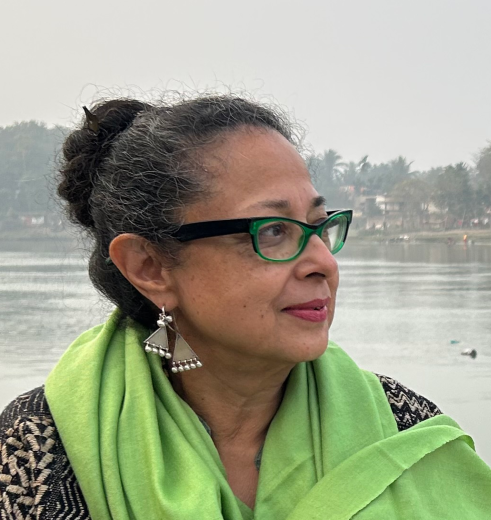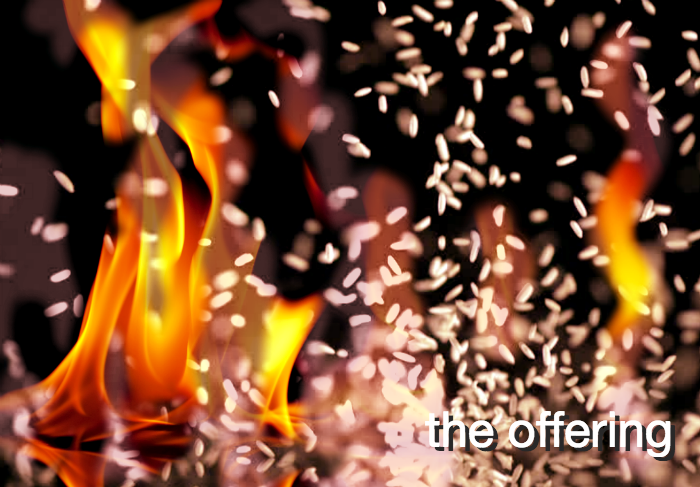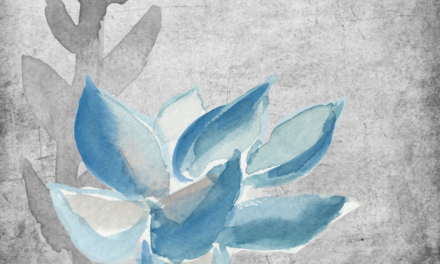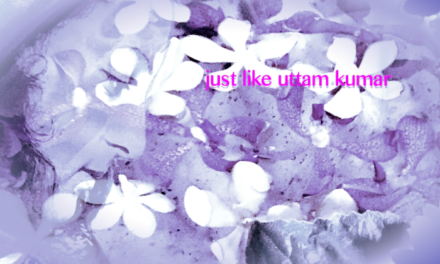The flames lunged up, their ends tapering, blowing, dancing, impatient and in a rush to catch the khoi. The parched rice, light, plump and crisp white, had just started to slide off the winnowing fan. It floated down, a lacework of shimmering grain. a streak of fire shot forward and caught a khoi. There was a spark of light, then it was gone.
A flash of heat hit her face. The sound of the khoi crackling as it burnt shot through her. Ira was suddenly aware of the arms around her, the grasp on her forearms. He stood behind her, the warmth of his body not far, for a moment she didn’t seem to know who it was.
Yet she knew, of course, how could she not. She was standing on the raised platform, the pirey with fine alpana, in her brilliant red Banarasi saree, paisley motifs in glittering gold thread shimmered all across, the red barely visible. Ornaments of gold and rubies, emeralds, and pearls covered her neck, her chest, her arms, a tiara of Belgian diamonds… Pishima kept saying those words… Belgian diamonds… what was so special about that? The tiara felt heavy on her forehead, but they’d insisted it looked very pretty. Her cousins Bula and Ruku had dressed her for the wedding. Pishima, her father’s elder sister, had sat on the bed, inspecting every move, giving or withholding approval. Shejo Kakima would do the chondon later, the pretty sandalwood paste markings on the forehead and chin, a dash on the nose too, that every bride wore. There had been a long debate as to who would put Ira’s chondon, the house was full of women who were artistic and loved to get involved in such matters.
The eldest daughter of the family was getting married, each aunt had her eye on getting a little praise for her contribution. Finally, it was decided Shejo Kakima, the wife of one of her father’s younger brothers, would be assigned the task. Her various other aunts, from her father’s side as well as her mother’s, would take charge of other things. The trousseau had to be arranged; then there were the ceremonies, Aiburo Bhaat when she had her last meal at home as an unmarried girl, Nanhi Mukh prayers early in the morning of the wedding day, Gaye Holud soon after that when turmeric paste would be put on her face and arms by married women, then there was the actual wedding with all the customs… so much had to be done, so many things seen to. Most importantly, the guests had to be taken care of. A group consisting of uncles, aunts, and cousins had been told very sternly by her grandmother to make sure no one felt unwelcome or left out in any way.
Arindam’s bare skin was just inches away from hers, he was wearing the dhoti of garad silk her mother had given him. The bride’s family presented the biyer jor, the set of clothes he’d get married in, to the bridegroom. A stole of the same material, the uttoriyo which completed the set, was draped over his shoulders but he wore no kurta. His hands were steady on her forearms as if he had done this many times before, strewn khoi into the fire of the Hom, performing the rite of Lajanjali, the offering of parched rice to Agni, the fire god, the ultimate witness at a wedding.
Why was there so much fire at every ceremony? As if constantly celebrating that first discovery millions of years ago. Was it because it was the first time we had felt we were in control, Ira thought distractedly. Or perhaps we were so astonished, then afraid that it might control us, consume us, devour us leaving no trace of our existence… and so endlessly we propitiated the inferno, feeding it the purest of fuel, chanting before it our most sacred hymns.
The priest was muttering away verses in Sanskrit. She couldn’t understand a word. She admonished herself. Why hadn’t she checked on the net? The last few days, she’d had a lot of time at work. She was leaving in a couple of months, she wouldn’t be given any important assignments now. Pete had offered her a position in Boston. He’d spoken to them, he’d said, but she had declined. Something hadn’t felt right about it all.
Had she wanted to go to Boston or been transferred there as part of the global team, that would be one thing. But she knew Pete was doing this only because he knew how disturbed she was feeling at being without a job suddenly. She’d joined Axiom straight after business school; campus placement. In India, the company was based in Bangalore. There had been great joy at home when everyone heard the news. Then the talk and worries had started. How would she live all by herself, in a different city… so far away? Bangalore was where all the excitement was, Shejo Kaku had announced during dinner one day, but it was in the south still. “Sambhar idli!” her cousin Shom had sniggered, “Bordi will eat sambhar idli every day!”
Ira’s father had laughed at that and said, “Hmmm, fish… fish, how will the Bengali live without it… what say, Shom!”
Then he’d looked at Ira, whose face had started showing her irritation by now, “I’m sure Ira will be fine. It’s a great job! And the waters of Cauvery… don’t worry, there’s plenty of fish in it.”
Everyone knew how happy her father was. He had always wanted Ira to study hard, do well, and work. Ashim Burman never spoke about it, but his father’s decision to not take his daughters’ education too seriously had always bothered him. None of his sisters had completed their graduation. When Bordi, that is, Ira’s Pishima, had lost her husband, she was only thirty two. She had two children to bring up and hardly any resources. Ashim and his brothers had of course taken care of their eldest sister. But her helplessness had disturbed him deeply.
Ira blinked, the flames had begun to blur before her eyes, she winced at the sight of the khoi burning.
Women ululated loudly.
Ira looked up, trying to get rid of the tears. Pete was standing right in front across the fire and the rising smoke, the smell of ghee made everything feel sacred and otherworldly at once. He was watching keenly, her aunts had made sure her boss had a good view of the ceremony. Ira’s American boss, they were absolutely thrilled with him. He was fair, tall, and handsome, he also had blue eyes. He was exactly as an American boss should be. They were delighted he had flown down with some of her colleagues to attend the wedding.
Ira was sure this was a bit of a Nat Geo moment for Pete. He’d not seen a Bengali wedding before. At weddings of colleagues or at festivals, he’d be completely absorbed, slightly shocked too Ira had the feeling. Later he’d say, all these felt like National Geographic stories to him. He meant it in the nicest possible way she knew, so she didn’t get mad at him.
She hadn’t fallen in love with his good looks. It was his sharp mind and his gentle ways that had attracted her at first. She hadn’t expected the gentleness. Then she started noticing she couldn’t concentrate while sitting across from him at his desk. Her eyes kept straying to the fabric of his shirt where it stretched over his shoulders as he moved.
They’d been working late that evening. It was almost one in the morning actually, a breakdown had to be resolved for a client in Copenhagen. They were all tired. Pete had opened a box of Domino’s pizzas and his eyes had lit up, he’d picked up a slice and said with that drawl of his, “Sometimes it’s just got to be soggy pizza and mystery cheese!” and taken a huge bite.
She’d felt something flip inside her. She could almost hear it. She’d known that was it, she had fallen in love with Pete. Not exactly a Nat Geo story, but her world had been shaken.
She had not told him anything. Nor anyone else. She’d waited for the feeling to go away. She was sure such things didn’t happen in real life, it was some sort of aberration. At one a.m., who was thinking straight? Besides, he most likely had a gorgeous girlfriend hanging around somewhere.
The feeling though had persisted.
He’d asked her out one evening, she had said Yes without thinking, a sudden burst of happiness in her. She had tried to be calm afterwards, but it had been hard. They’d gone to Paradise Island and had a wonderful Thai dinner. He had dropped her home and she had stood awkwardly in front of him for a moment, before turning to open her door. He had smiled that amiable smile of his and said, “See you tomorrow, Ira.”
No, he hadn’t followed her inside.
They had gone out a few times more and then the news had come.
Her father had passed away. A heart attack while he was in Bombay on work.
Ira realised she was staring at Pete. He was looking at the khoi pouring into the fire. She wondered what he was thinking.
Nothing had seemed to matter any more. She had gone to Calcutta and returned after a week. She had worked, sometimes relieved at what work brought. Shejo Kakima’s voice on the phone, “Ira, I’m afraid…” she could here it at times again and again, sometimes though she couldn’t recall how Shejo Kakima sounded at all.
She used to sit with her father in the room at the end of the outhouse, her study room. It was his study room once. He had given her a Parker pen when she did well in her higher secondary exams, she’d kept it in a box in the alcove cut into the wall, a place to put lanterns in the old days. Sometimes she thought she could hear her father exclaiming about the shortcomings of the syllabus.
Her colleagues had been helpful and understanding, her housemate Jaya started making sure she had her meals. Ira was grateful.
Pete would drop in for a chat at her cubicle at times. Six months had passed by, then nine. Arindam was Pishima’s sister in law’s brother’s son. They were looking for a smart, educated, good looking bride for him. Pishima had spoken to her uncles, then her mother. Ma had called Ira. Ira hadn’t known what to say.
She would have refused but she had heard the bereft undertone in ma’s voice. Ma rarely cried. Ira knew Ma would like to see her married. She was twenty eight already, though people said nothing, it was mainly because they knew her father would insist all this talk of marriageable age, etc., was nonsense.
Ira had agreed to meet Arindam. He was a pleasant enough person. He was bright, he lived in Boston, he was working well… at one of the better known consultancies. He’d make it to partner, no doubt. When she’d spoken of her career, he’d said, not to worry, she could take it easy and relax a bit… he had smiled slightly. She would find a job in Boston, he was sure. She’d almost asked him, what he thought of relocating to Bangalore and coming to stay with her for a while…
She had taken a couple of weeks to decide, then agreed to the proposal.
Why does fire eat up everything? Why this voracious appetite? Was it denied too long in another life, somewhere?
She had held Pete’s hand that night, she had held it tight and pulled him after her into the house. They had gone out for a movie and a drink earlier, when they returned, she had not been able to let him leave. He had lain next to her after… after everything… his thumb rubbing against her neck. He had tried to stop her, but she had been adamant, she had wanted, she had wanted something, she had no idea what.
She felt the arms around her move away. The Lajanjali was over. The priest was asking the bride and bridegroom to be seated again. Her cousin and aunt hovered around helping her. Ma wasn’t here because mothers aren’t supposed to be present at the wedding apparently. Ira had found the idea foolish, but then what was not? Perhaps this whole thing called life was a series of foolish utterances and incidents.
The priest was dousing the fire when she knew for certain she couldn’t go through with this. It was a simple clear thought, part of her noted it was an outrageous thought. Even a ridiculous one. Yet, she knew she could not go on and let Arindam put a streak of vermilion on the parting of her hair… the final act of a wedding, when she became a man’s wife and he her husband. She had to step out of this moment, this inevitability. No one would ever forgive her, perhaps she’d never forgive herself.
A fire raged wildly. She took a deep breath and said, “Arindam, I’m sorry… I can’t do this.”
She wished she could do something about that startled, disbelieving look in his eyes as he turned toward her.
“What is she saying, what is Iru saying?” Pishima asked Shejo Kaku.
The guests were exchanging mystified looks, there seemed to be something going on between the bride and bridegroom. Her cousin gripped her elbow tight, “Didi, Didi, are you okay?!” she could hear her whisper.
She was not okay but she had to end this now. Pete had walked up to practically where they were standing, he had a slight frown and seemed perplexed, he was looking directly at her. She knew nothing about what she was going to do was right, but the other option would be only wrong, not just not right.
She was glad though, Ma wasn’t here. Maybe foolish ideas had some merit in them just like soggy pizza and mystery cheese. She almost smiled. She could feel the touch of Pete’s thumb on her neck, perhaps the only thing that had registered in a long, long time. She stood up and took a step, and then another.
Her father would not have been proud of her at this moment, but perhaps he would have understood.
She walked slowly away from the wedding mandap, lifting her saree up a little so as not to trip. How much khoi had to burn and turn to ashes, she wondered, before the fire was appeased.
…………………………………………………………………………………………………………………………………………
A lot of Bengali words, hope that wasn’t confusing. Been trying to find the exact English word/s for “khoi”, I think it’s parched rice. “Pirey” is a small wooden platform, a couple of inches high, on which one sits. During weddings, these are specially decorated for the bride and bridegroom. “Alpana” is a freehand style of sketching images/motifs with a pounded rice paste. “Hom” is a ritual in which offerings are made to a consecrated fire. “Bordi” is how you might address your elder sister, or even simply “Didi”. “Shejo” is the third one in a set of siblings or cousins, the eldest is “boro”, then comes “mejo”, followed by “shejo”, then “chhoto” the youngest. If there’s a fifth and a sixth sibling, they could be “ranga” and “naw”. That’s the simple version. This is another story that has its roots in a house from my childhood, a rambling place, apartments to live in thrust into a complex meant to be an ashram, a temple, a pond, unkempt green, garages, vintage cars, all sorts of people you never meet in a “normal” home, yeah, we were never that. Thanks for reading. Do leave a comment please, I hope to hear from you.
the featured visual is created using two images from the net, thanks to the uploaders.





